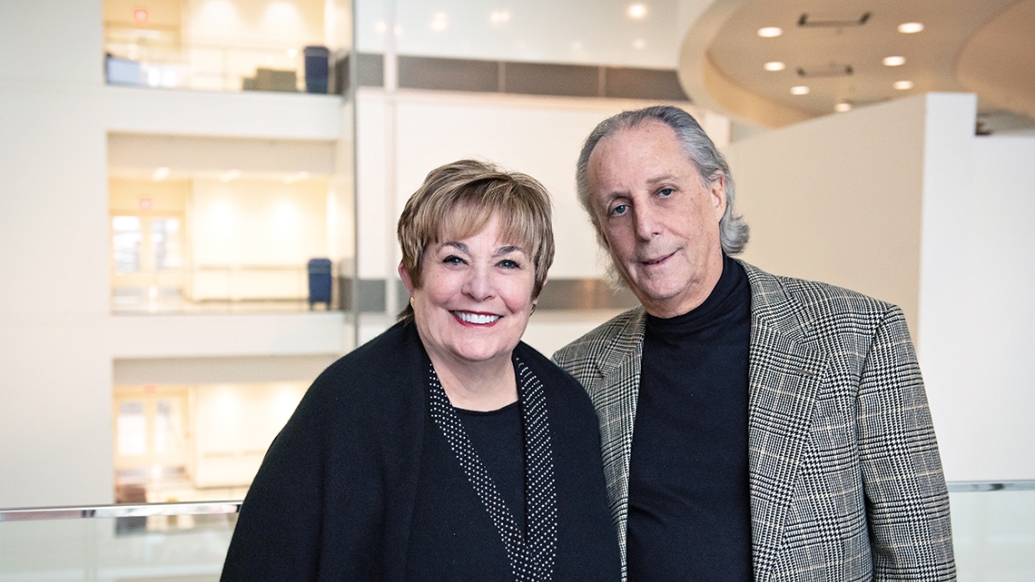Gift will establish the Frankel Innovation Initiative to accelerate development of life-saving therapies.
Author |

A $20 million gift from the Maxine and Stuart Frankel Foundation of Bloomfield Hills, Michigan, will support the research and development of life-saving therapies at Michigan Medicine in collaboration with other institutions. The gift, which will be used to establish the Maxine and Stuart Frankel Innovation Initiative, will advance U-M faculty-led, collaborative projects that have the potential for rapid clinical application.
"We hope this gift will create an environment that will support collaboration among professionals," says Stuart Frankel. "We encourage doctors, researchers, people from engineering and other areas, to work together in hopes of achieving monumental, life-saving research. We want the best minds from the University of Michigan and around the world to collaborate on the most innovative research and take scientific discovery to a new level."
"Maxine and Stuart Frankel's gift will ensure that the University of Michigan advances its leadership in cutting-edge research that saves lives in our communities," says U-M President Mark Schlissel. "The gift will help us translate scientific discoveries into treatments that can reach patients in need. I appreciate the Frankels' generosity and their commitment to both innovation and U-M's very special role as a top public university."
The Initiative will build on best practices of the standout programs developed at U-M and other top institutions, capitalizing on the university's extensive biomedical research enterprise as the top public university in research spending in the United States.
"We are extremely grateful for this gift, which will allow our researchers to move their cutting-edge therapies and other innovative approaches to improving health faster into the life-saving hands of clinicians and scientists everywhere," says Marschall S. Runge, M.D., Ph.D., dean of the Medical School, executive vice president for medical affairs at U-M, and CEO of Michigan Medicine.
"Michigan Medicine is a leader in translational medicine, and our researchers are renowned for their enthusiasm and expertise when it comes to collaboration, both here at the university and globally. This generous support from the Frankels will go a long way toward accelerating this creative engagement and resulting research to market," says Steven L. Kunkel, Ph.D., the Peter A. Ward Distinguished University Professor, executive vice dean for research of the Medical School, and chief scientific officer of Michigan Medicine. He also is the Endowed Professor of Pathology Research.
The Initiative will be administered by Fast Forward Medical Innovation (FFMI), a unit of Michigan Medicine with deep expertise in moving medical technologies from idea to commercialization. "Through FFMI and a host of other established resources at Michigan Medicine, we are committed to bringing together biomedical innovation and entrepreneurship. As such, we are well-positioned to partner with other institutions to transform the Frankels' generosity into results — moving from the early stages of research into life-saving therapies," says Bradley Martin (Ph.D. 1993), managing director of FFMI.
Maxine and Stuart Frankel, both graduates of U-M, have a long history in philanthropy. Their latest gift is inspired in part by the groundbreaking work of Robert Bartlett (M.D. 1963), professor emeritus in the department of surgery, who is known as the father of ECMO (extracorporeal membrane oxygenation), a revolutionary machine used to replace the function of the heart and lungs in critically ill patients.
Bartlett, with continued support from the Frankels through this gift, is currently working with several collaborators throughout U-M to develop other life-support technologies, including work that could increase the viability of organs for transplantation.
The Frankels also have supported the translational research program of H. David Humes, M.D., professor of internal medicine, and his group. This program has developed innovative devices to treat a variety of inflammatory conditions, including systemic infections and sepsis, that have very high mortality rates. This gift will continue to support Humes' program to develop and evaluate miniaturized devices to treat neonates and infants in the intensive care unit.
Humes' and Bartlett's work are examples of the collaborative spirit behind the new gift. A clinical trial of Humes' pediatric sepsis device is underway at seven hospitals around the country, illustrating that the innovative research pursued at one institution can be bolstered by the work of multiple researchers and institutions. Bartlett is leading a worldwide group of scientists who are trying to solve the limitations to prolonged organ perfusion. Typically, organ preservation by perfusion is limited to six hours, but in laboratory tests, the Michigan Medicine team has perfused hearts of animal models for three days.
After meeting Bartlett, Humes, and others, the Frankels recognized that similar high-risk, high-reward research occurring throughout the university could benefit from investment by private enterprise. The gift will be used to fund five to seven projects per year, which will be selected by an oversight committee of internationally renowned scientists and venture capitalists external to U-M. The Frankels will also be involved in this process.
Ultimately, the Initiative's goal is to improve health and save lives. "We were most interested in funding research at the initial stages so the scientists are able to have the support to get where they need to go," says Maxine Frankel. "There's no stopping them once they have the support that they need. The results could be monumental."





